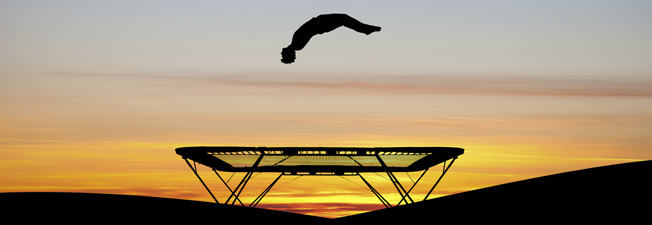A guide to buying a trampoline

Children and families can get so much out of a trampoline. It provides hours of instant ready-made fun, a chance for children and adults to improve on fitness levels, and it can also improve motor skills, teamwork skills and build on confidence.
Before purchasing a trampoline, there are a few key things to consider. Below Newitts offers a complete guide to buying a trampoline.
What size should I buy?
The size of the trampoline you buy will be determined by two key factors, the size of the space you have to house it, and the size of your children! In general, the bigger the trampoline, the better it will be for children. A large trampoline will accommodate more than one child on it at once and will help to prevent injury. It's important to remember that a 12 foot trampoline will only provide you with a 10 foot bounce area due to the safety pads which cover the strings - these are approximately 12 inches wide.
What sizes are available?
There are different sizes of trampoline available to suit a range of spaces. The most popular size is the 12 foot trampoline - it offers plenty of bounce space and still doesn't obstruct your garden too much, however, if you've got a smaller garden then an 8 or 10 foot trampoline will be a better option. Smaller trampolines are also more suited to toddlers and pre-school age children. If space isn't an issue at all, why not opt or a 14 foot trampoline to entertain all your friends!
Where will I put it?
To work out if your chosen trampoline will fit your garden, try laying a piece of hosepipe or rope in the area where your trampoline will sit to gain a better idea. You need to also think about the surface your are putting the trampoline on. Are you happy for the grass underneath it to die? Or would it be better placed on a patio or paving stones? If you're putting the trampoline on a hard surface, always remember to provide cushioning for the legs.
How to position your trampoline
Make sure you place the trampoline on a level surface and that there's enough space either side to make it safe and comfortable to get on and off. Ensure its positioned away from trees and any other obstacles you could get caught up in when bouncing. If possible, place the trampoline on grass or another soft base for a soft landing in the event of any falls.
What is the best shape?
Most people opt for the round shape of trampoline which offers a medium impact bounce, but you can also obtain an oval shaped trampoline which contains a higher bounce impact that will also work well. It is possible to buy safety nets to accommodate both shapes. Rectangular trampolines are usually saved for professionals and registered clubs. There are also trampolines available that sit just above a hole dug in the ground, so your garden can be less spoilt by the view!
What should I look out for?
To ensure your trampoline offers high performance and is a strong lasting product, choosing a frame made of strong galvanised steel will ensure the trampoline remains rust free and able to cope with the high levels of stress the frame will endure when in use. The enclosure should also be made of galvanised steel and sit securely to the trampoline frame. This will keep the jumper from landing on the springs and frame whilst providing the maximum amount of jumping space. In addition, make sure the pad covers are made of strong weather proof material with a thick layer of padding which will provide additional protection from the springs and metal frame.
How much should I spend?
This is very much a personal decision, but the key to getting good value for money is to spend time researching the different types of trampolines available to gain a better understanding of what they should be worth. In general, if you are willing to invest a bit more cash, more expensive trampolines will have longer, thicker springs and thicker steel frames. They will also last longer, often more than 10 years, and don't need to be stored inside when not in use. In a nutshell, you'll get what you pay for, so if you can afford to spend a little bit more, it's worth it.
Trampoline safety
Most large trampolines are sold with enclosures to provide a safer environment for play. The trampoline enclosure is designed to keep the user within a safe area whilst using the trampoline, to reduce the risk of falling off it, but to ensure safety you should also take some extra precautions:
- Allow a safety perimeter of 2.50m around the trampoline
- Only one person should use the trampoline at a time
- Children should always be supervised by an adult
- Children should only use a trampoline that is suitable for their age
- Make sure shoes and jewellery are removed before using the trampoline
